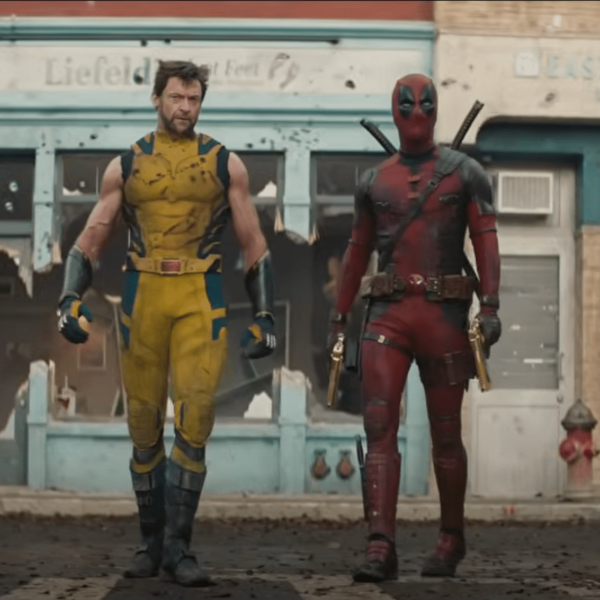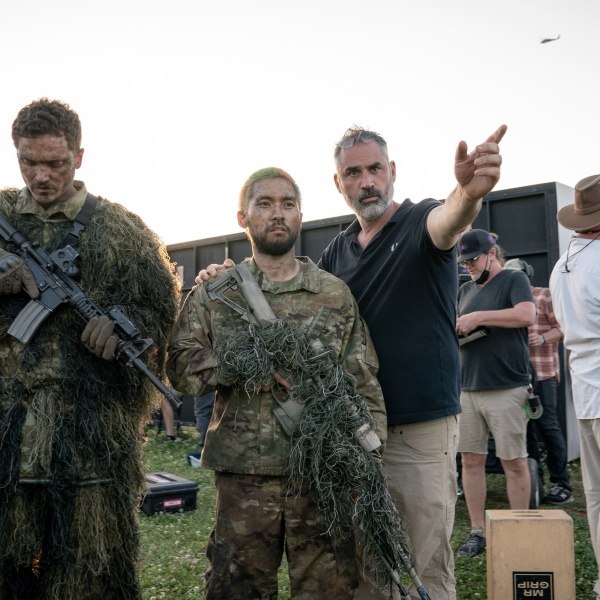
One of the more fascinating aspects of “American Symphony” is that both Oscar- and Grammy-winning musician Jon Batiste and his wife Suleika Jaouad, the bestselling author of “Between Two Kingdoms,” would have made compelling documentary subjects at any point in their careers. It just so happens that when the former “Late Show with Stephen Colbert” band leader had the idea to recruit his “The First Wave” collaborator Matthew Heineman to make a film about his symphony’s Carnegie Hall debut, the Oscar-nominated director fell upon more poignant material than they all could have imagined.
A month into production, Batiste became the first musician to be nominated in seven different Grammy categories. That same day in November 2021, Jaouad began treatment for leukemia after years of being in remission. “It became an even broader aperture of what a documentary of this period of time would be. And we had to decide, all three of us, if we wanted to move forward with that,” said Batiste in conversation with IndieWire at the Netflix offices in Los Angeles. “What it would be was something that constantly evolved, and ultimately was up to Matt to synthesize all of what was happening, both the expected and unexpected.”
Though Jaouad had always been game to appear in the project, having had a little bit of experience in front of the camera for the Emmy-winning video version of her New York Times column “Life Interrupted,” produced the first time she was sick in her early twenties, “American Symphony” became a completely different kind of undertaking. “We filmed from sun up and sun down seven days a week for seven months and had I think over 1,500 hours of footage by the end of that. And we really didn’t know what kind of story this documentary would carry,” said the memoirist and motivational speaker. “The truth is, I didn’t even know if I would survive long enough to get to see the documentary. So it really required a huge leap of faith and a huge amount of trust from both of us to open our lives up in this way, and to surrender to the process.”
That said, “we couldn’t tell the story of ‘American Symphony’ without telling the story of the symphony of life that was unfolding behind closed doors,” added Jaouad.

As much as the Telluride premiere, acquired by Netflix and produced by the Obama’s High Ground, added stress to the couple’s lives, Batiste knew he wanted cameras there for all the good things, like his historic Grammys night that were happening simultaneously. “The peaks also made it feel, for me, like a great chronicle for our family. Whether the film ever came out or not. Knowing that this has been documented for our family’s sake was important to me. And also Suleika, because our wedding is in there, that’s our wedding footage. This premiere, this seminal work. The ultimately hugely successful, miraculous treatment that happened. All of this stuff is milestones,” said the “Freedom” singer. “It is actually insane that the film and what Matt made is so good that the number of times history has been made is a footnote. It’s like, ‘This is not a normal year.’”
The extremities occurring in “American Symphony” may not be the most relatable aspect of the film, but how Batiste and Jaouad handle the curveballs life threw at them in such a concentrated period of time is. “So often, especially with people in the public eye, we only see the highlights reel of their life. And I think there’s an unintended alienation that can come from that and just show the whole range of the human condition, both the extraordinary moments and the deeply, deeply hard ones, especially when they’re happening simultaneously felt like a much truer, more honest version of the story and hopefully one that might offer companionship to other people having to hold the hard and the good in the same palm,” said Jaouad.
She added, “This documentary, as unexpected as it was for us, was a perfect example of the message that I hope that people are left with, which is that life does not go according to plan. Things happen. Good things happen. Things that break your heart, that bring you to your knees will happen. And you have a choice in terms of what you want to do in response to those events. And we say in the doc, and we live it and we believe it, which is that survival is its own kind of creative act.”
Part of what helped the couple through Jaouad’s cancer battle, and recovery from a life-saving bone marrow transplant, was her painting while he began composing her lullabies. “We made the hospital this creative artistic space, which is so counter to the culture of being in the hospital, but so important for healing, obviously as Suleika has exemplified in all her work,” said Batiste.
In an exclusive video above explaining how the film’s original song contender “It Never Went Away,” which closes the film, came to be, the musician said, “Ideas stick with you in your subconscious mind, bringing them back up to you in dreams.” An original song at first seemed like too great a challenge. “How do you make it true to life and use all that information to do something that is just beautiful and real? I wanted it to feel as tied to the film as your spirit is to your body,” said Batiste.
The aforementioned lullabies that came out of the therapeutic filmmaking process, and were further shaped in a unique, emotional songwriting process with producer Dan Wilson, became the key to work Batiste and Jaouad never quite expected to be involved in, but are incredibly proud of. “Whenever I see the film, I’m struck, especially by the passages in the hospital, and how different I look and feel now. And I think for me, it’s a reminder that everything is in flux, everything is changing, and the human spirit is deeply resilient and tenacious. And I’m so happy to see it resonating with people and to hear people finding their own connections to the film,” said Jaouad of the Best Documentary Feature contender.
She added, “It feels like there’s something in there for everyone. Whether you’re a music lover or whether you’ve had health challenges or whether you’re embarking on a new relationship, whatever it might be. So I don’t feel like those stories belong to us anymore. We’ve kind of set them free and they’re for other people to make meaning of.”





